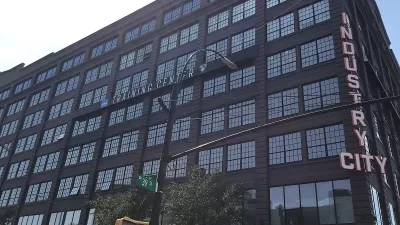The creator of "The Wire" talks to CityLab about "The Deuce," New York City in the 1970s, and how strategies for one town won't always work for another.

Until recently, most of David Simon’s literary and television projects have been based in America’s less-gentrified cities. "Homicide: Life on the Streets" and "The Wire" took place in Baltimore, "Treme" in New Orleans and "Show Me a Hero" in the rarely celebrated town of Yonkers.
His newest, "The Deuce," about the legalization and popularization of pornography, takes place largely in Midtown Manhattan in the early 1970s. It is resplendent with wardrobe and hairstyles true to the period, and it is a portrait of a Times Square that is virtually unrecognizable next to the current one.
Simon doesn't necessarily subscribe to the nostalgia for a seedier New York that is hard to avoid in the city, but neither does he see any lessons in urbanism. "New York’s future is not indicative of a resolution to America’s urban problems," Simon tells CityLab, "[it] has metrics that other cities can’t replicate economically or culturally."
More than new police tactics or social programs, the mayors that presided over the city during its most transformative year—he names Ed Koch and Rudy Guiliani—"were able to money the city again," Simon said, referencing Baltimore’s attempt to adopt "broken windows" policing.
Recognizing the cultural dilution that has come with a safer New York, Simon added, "Not that I’m rushing into Bubba Gump Shrimp in Times Square, but, hey, it’s tax base. I mean, I don’t mean to make fun. When stuff [like that] shows up in Baltimore, Maryland, I’m happy. I’ve watched my city lose 120,000 people. The idea that any business wants to come back in and start up—OK, welcome."
FULL STORY: CityLab

Planetizen Federal Action Tracker
A weekly monitor of how Trump’s orders and actions are impacting planners and planning in America.

Restaurant Patios Were a Pandemic Win — Why Were They so Hard to Keep?
Social distancing requirements and changes in travel patterns prompted cities to pilot new uses for street and sidewalk space. Then it got complicated.

Map: Where Senate Republicans Want to Sell Your Public Lands
For public land advocates, the Senate Republicans’ proposal to sell millions of acres of public land in the West is “the biggest fight of their careers.”

Maui's Vacation Rental Debate Turns Ugly
Verbal attacks, misinformation campaigns and fistfights plague a high-stakes debate to convert thousands of vacation rentals into long-term housing.

San Francisco Suspends Traffic Calming Amidst Record Deaths
Citing “a challenging fiscal landscape,” the city will cease the program on the heels of 42 traffic deaths, including 24 pedestrians.

California Homeless Arrests, Citations Spike After Ruling
An investigation reveals that anti-homeless actions increased up to 500% after Grants Pass v. Johnson — even in cities claiming no policy change.
Urban Design for Planners 1: Software Tools
This six-course series explores essential urban design concepts using open source software and equips planners with the tools they need to participate fully in the urban design process.
Planning for Universal Design
Learn the tools for implementing Universal Design in planning regulations.
Heyer Gruel & Associates PA
JM Goldson LLC
Custer County Colorado
City of Camden Redevelopment Agency
City of Astoria
Transportation Research & Education Center (TREC) at Portland State University
Camden Redevelopment Agency
City of Claremont
Municipality of Princeton (NJ)





























